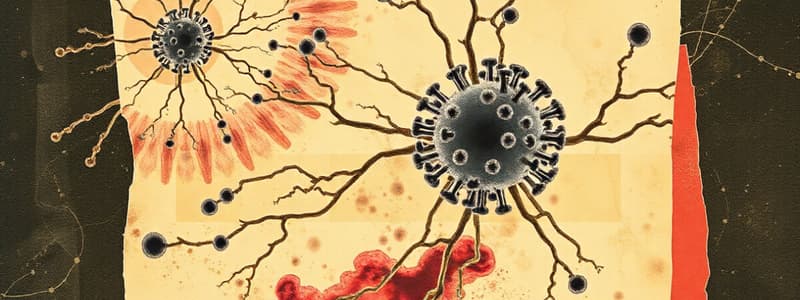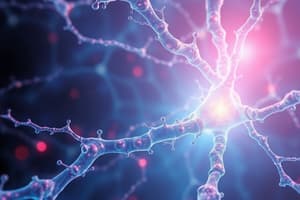Podcast
Questions and Answers
What initiates the transformation of a fibroblast into a fibrocyte?
What initiates the transformation of a fibroblast into a fibrocyte?
- Increased activity of the fibroblast
- Migration of fibroblasts towards macrophages
- Decreased activity and maturation of the fibroblast (correct)
- Injury to the connective tissue
Which component is NOT formed by fibroblasts?
Which component is NOT formed by fibroblasts?
- Lysosomal enzymes (correct)
- Elastin
- Reticulin
- Collagen
Which characteristic is unique to macrophages compared to fibroblasts?
Which characteristic is unique to macrophages compared to fibroblasts?
- Vesicular nucleus
- Presence of pseudopodia (correct)
- Basophilic cytoplasm
- Pale nucleus
What is the primary function of myofibroblasts during wound healing?
What is the primary function of myofibroblasts during wound healing?
Which type of immunity do fixed macrophages primarily support?
Which type of immunity do fixed macrophages primarily support?
What is a defining characteristic of the nucleus of fixed macrophages?
What is a defining characteristic of the nucleus of fixed macrophages?
How do adipocytes primarily differ from fibroblasts in structure?
How do adipocytes primarily differ from fibroblasts in structure?
Which statement regarding the function of fibroblasts is true?
Which statement regarding the function of fibroblasts is true?
What is the primary function of unilocular adipocytes?
What is the primary function of unilocular adipocytes?
In which specific anatomical locations are multilocular adipocytes predominantly found?
In which specific anatomical locations are multilocular adipocytes predominantly found?
What unique feature of multilocular adipocytes contributes to their function in heat production?
What unique feature of multilocular adipocytes contributes to their function in heat production?
Which characteristic distinguishes unilocular fat cells in histological sections?
Which characteristic distinguishes unilocular fat cells in histological sections?
What is the major role of pericytes in adult connective tissue?
What is the major role of pericytes in adult connective tissue?
What does the mesenchymal cell differentiate into during embryonic tissue development?
What does the mesenchymal cell differentiate into during embryonic tissue development?
What morphological feature is characteristic of unilocular adipocytes?
What morphological feature is characteristic of unilocular adipocytes?
What is the function of endothelial cells in blood vessels?
What is the function of endothelial cells in blood vessels?
Flashcards
Fibroblast Function
Fibroblast Function
Fibroblasts create connective tissue fibers (collagen, elastin, reticulin) and the matrix's mucoprotein component. They increase in number during tissue repair and wound healing.
Fibroblast to Myofibroblast
Fibroblast to Myofibroblast
Fibroblasts can transform into myofibroblasts, which contain contractile filaments to aid in wound closure.
Macrophage Origin
Macrophage Origin
Macrophages arise from blood monocytes that migrate into connective tissue.
Macrophage Function
Macrophage Function
Signup and view all the flashcards
Macrophage Shape
Macrophage Shape
Signup and view all the flashcards
Adipocyte Origin
Adipocyte Origin
Signup and view all the flashcards
Fixed Macrophage
Fixed Macrophage
Signup and view all the flashcards
Myofibroblast
Myofibroblast
Signup and view all the flashcards
Unilocular adipocyte
Unilocular adipocyte
Signup and view all the flashcards
Multilocular adipocyte
Multilocular adipocyte
Signup and view all the flashcards
Mesenchymal cell
Mesenchymal cell
Signup and view all the flashcards
Pericyte
Pericyte
Signup and view all the flashcards
Endothelial cell
Endothelial cell
Signup and view all the flashcards
Adipocytes, Types
Adipocytes, Types
Signup and view all the flashcards
Multilocular function
Multilocular function
Signup and view all the flashcards
Mesenchymal cell, function
Mesenchymal cell, function
Signup and view all the flashcards
Study Notes
Connective Tissue Cells
- Fibroblasts and Fibrocytes:
- Fibroblasts develop from pericytes and mesenchymal cells.
- As fibroblasts mature, they become less active, transforming into fibrocytes.
- Fibroblasts create connective tissue fibers and the matrix.
- Abundant in areolar connective tissue.
- Fibroblasts can change into contractile myofibroblasts, which contain contractile filaments. These cells help close wounds during healing.
- Fixed Macrophages (Histocytes):
- Originate from blood monocytes that migrate to connective tissue.
- Motile cells with multiple processes (pseudopodia).
- Cytoplasm is basophilic.
- Rich in lysosomes and phagocytosed materials.
- Nucleus is indented, kidney-shaped, and darkly stained (hetero-chromatin rich).
- Differentiate them from fibroblasts because of their lightly stained nuclei
- Can be stained with vital stains like trypan blue or black Indian ink.
- Adipose Cell (Adipocyte):
- Derived from mesenchymal cells, fat accumulates in the cytoplasm.
- Two types:
- Unilocular (Fat) Cells: Large, oval cells with flattened peripheral nuclei. Contain a large fat globule. The cells are surrounded by a small amount of cytoplasm.
- Multilocular (Brown) Adipocytes: Found in newborns, highly vascular, contain multiple fat droplets, abundant mitochondria, and are involved in heat production. Located in the neck, shoulders, back, axilla, and para-aortic regions.
- Mesenchymal Cells (UMCs):
- Embryonic, branched cells with large, oval nuclei and basophilic cytoplasm.
- Can differentiate into various connective tissue cell types.
- Pericytes:
- Pale, branched cells with long cytoplasmic processes.
- Surround the endothelial lining of blood capillaries and small venules.
- Considered mesenchymal cells.
- Can differentiate into fibroblasts.
Other Connective Tissue Cell Types
-
Endothelial Cells:
- Line the inner surface of blood vessels.
- Synthesize type IV collagen.
- Can divide to form new capillaries in response to tissue damage.
- Produce basal lamina.
-
Reticular Cells:
- Modified fibroblasts found in reticular connective tissue.
- Secrete reticular fibers.
- Branched with a small, oval nucleus, and many processes.
- Form a network of reticular connective tissue.
- Form the stroma of glands, organs, and bone marrow.
- Remove cellular debris from lymphatic organs.
Studying That Suits You
Use AI to generate personalized quizzes and flashcards to suit your learning preferences.




